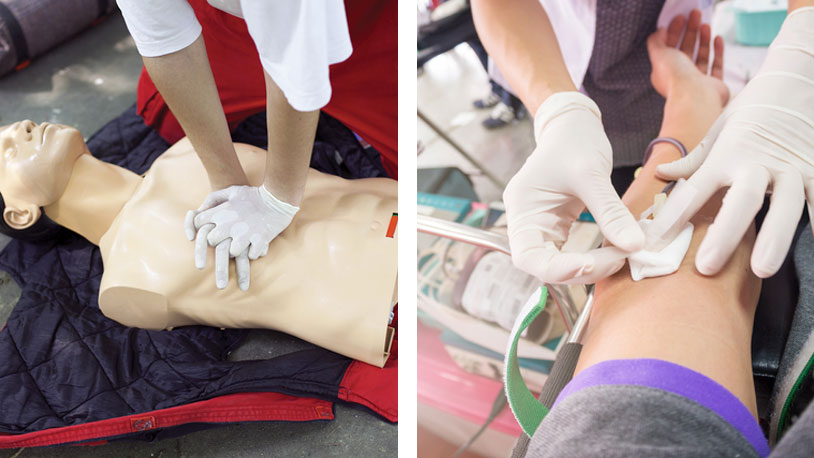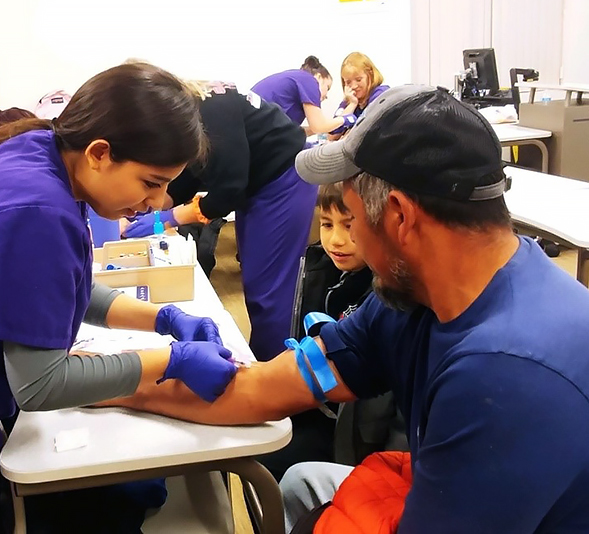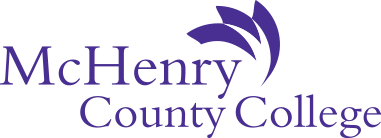
Workforce Training for Healthcare Careers
Build stackable credentials with MCC's professional healthcare certification programs. Receive a nationally recognized certification through the National Healthcareer Association (NHA) or the Healthcare Sterile Processing Association (HSPA). Each course includes the price of taking your initial certification exam through NHA or HSPA after you successfully complete the course.
These are career training certificate programs that will prepare you to earn industry-recognized credentials.
These programs are eligible for Pipeline for the Advancement of the Healthcare Workforce (PATH) grant funding. Learn how the PATH grant can help you pay for training and more »
- Electrocardiogram (EKG) Technician Training
Prepare to become a Certified EKG Technician (CET)! Study basic to advanced concepts in EKG. Learn basic cardiac anatomy and physiology, proper lead placement for 5- and 12-lead, technical aspects of an EKG machine and how to calculate heart rate, how to interpret a rhythm strip, and several advanced concepts working with the 12-lead EKG machines. You'll learn how to prep a patient for EKG monitoring and troubleshoot EKG artifact.
This course is designed for those who have completed Basic Nursing Assistant (CNA), CPR, EMT, or other medically-related coursework. This training, along with your previous certification, allows you to assist physicians in diagnosing myocardial infarction, cardiac arrhythmias, and heart rhythm irregularities. EKG machines are used in physicians' offices, hospitals, clinics, and other health care facilities.
The $999 fee for this course includes all books, materials and the cost of the National Health Careers (NHA) Certified EKG Technician (CET) exam to be taken at the end of the course. High school students pay $500.
- Medical Assistant Academy
Review what you learned in your prerequisite courses (Basic Nursing Assistant, Electrocardiogram Technician, and Phlebotomy Technician) in the Medical Assistant Capstone course. Train to work under the supervision of a practice/operations manager to perform the following: schedule appointments, patient intake and care, routine diagnostic and recording procedures, maintain medical records, prepare patients for examination, drawing blood, medicine administration, first aid, and record vital signs and medical histories.
Note: You must complete CNA, EKG, and phlebotomy training before you can enroll in the Medical Assistant Academy.
By the numbers:
- Job outlook: employment of medical assistants is projected to grow 14% 2022 to 2032.
- Medical Assistant was ranked #11 in Best Healthcare Support Jobs, #77 in 100 Best Jobs in the U.S. News Best Jobs Rankings.
Coursework includes basic anatomy and physiology; medical terminology; medical law and ethics; patient psychology and communications; medical office procedures; and clinical diagnostic, examination, testing, and treatment procedures.
The $1,999 fee includes all books, materials and the cost of the National Healthcareers (NHA) Certified Clinical Medical Assistant (CCMA) certification exam to be taken at the end of the course.
See course dates and register for the Medical Assistant Capstone course »
- Pharmacy Technician Training
The Professional Pharmacy Technician Training is designed to teach you the fundamentals and particulars of being a pharmacy technician. You'll learn to effectively assist in pharmaceutical preparations and complete daily required tasks in any pharmacy environment, although on-the-job training is still a part of pharmacy training.
The $1,999 fee for this course includes all books, lab materials, and the cost of the National Health Careers (NHA) ExCPT exam to be taken at the end of the class.
Note: This program is not accredited by the American Society of Health System Pharmacists (ASHP). Students who successfully complete the program and pass the ExCPT will have a nationally recognized credential, but will need to meet state licensure requirements separately.
See course dates and register for Pharmacy Technician Training »
- Phlebotomy Technician Training
 Phlebotomists draw blood for tests, transfusions, research, or blood donations. As an NHA-Certified Phlebotomy Technician (CPT), you can work in a variety of healthcare settings and perform critical work in the healthcare field. The job outlook through 2030 shows 22% growth, much faster than average.
Phlebotomists draw blood for tests, transfusions, research, or blood donations. As an NHA-Certified Phlebotomy Technician (CPT), you can work in a variety of healthcare settings and perform critical work in the healthcare field. The job outlook through 2030 shows 22% growth, much faster than average. MCC's certification program consists of 60 classroom and lab hours in which you'll be required to complete a minimum of 30 venipunctures and 10 capillary sticks (must be able to find volunteers—friends, family, etc.). Students will both administer and receive venipunctures and capillary sticks.
The $1,999 fee for this course includes all books, materials and the cost of the National Health Careers (NHA) Phlebotomy Technician Certification (CPT) exam to be taken at the end of the class.
See course dates and register for Phlebotomy Technician Training »
Download Phlebotomy technician training program medical form»
- Sterile Processing Technician Training
Prepare for a vital role in the healthcare field with MCC’s Sterile Processing Technician Training program. This hands-on course trains students to clean, sterilize, assemble, and distribute surgical instruments and medical equipment in hospitals and surgical centers. Aligned with the standards of the Healthcare Sterile Processing Association (HSPA), this program prepares students for the Registered Central Service Technician (CRCST) exam. Students will have a provisional license until they complete the 400-hour clinical. Clinical schedules are determined by student and preceptor. Completion times vary.
Students will gain practical knowledge in microbiology, infection control, sterilization techniques, surgical instrumentation, and inventory management. The course combines classroom instruction with clinical lab experiences to ensure students are job-ready and qualified to pursue entry-level positions in sterile processing departments.
The $1,999 fee for this course includes all books, materials, and the cost of the HSPA CRCST exam to be taken at the end of the class.
Career Outlook
Are you looking for credit certificates and Associate in Applied Science degrees like:
